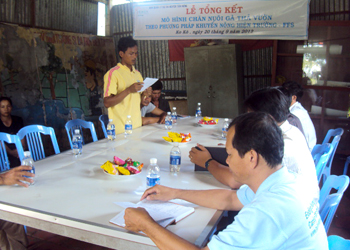Written by Nguyen Thai Loc | Community Facilitator | Heifer Vietnam
Translated by Nguyen Thi Phuong Tham | Training Officer | Heifer Vietnam
 Backyard chicken production is a popular production model in rural areas. Ko Ko is a remote village in Vietnam where many people are raising backyard chickens; however, diseases and a deficiency in technical knowledge has made success elusive for some farmers.
Backyard chicken production is a popular production model in rural areas. Ko Ko is a remote village in Vietnam where many people are raising backyard chickens; however, diseases and a deficiency in technical knowledge has made success elusive for some farmers.
To address this, Heifer Vietnam and its provincial project partner conducted a Farmer Field School (FFS) on April 18, 2012, on backyard chicken production to help improve participating farmers’ knowledge of bio-safety production and to help improve their livelihoods. After four months of training, practicing and harvesting, the FFS ended with a meeting of the project management board and 25 participating households to share experiences. Lam Sa Rich, one of the FFS model farmers, said, “During the process, I have learned a lot of useful experiences such as vaccination to prevent H5N1 disease, fowl pox and how to disinfect the cage and take care of the chickens in a specific period.”
The bad weather in the village, which is part of the project Improving Capacity for Poor Households in Tan Hung Village, Long Phu District, Soc Trang Province, coupled with the farmers lack of experience, resulted in some chicken deaths. The project participants and project management board joined together to address the problems.
Nguyen Thanh Binh, regional project manager, said, “The problems turned out to be opportunities for the farmers to draw useful experiences to apply into their production practices after the FFS training.”
Lam Thi Thu Thuy, one of the female participants, said eagerly, “After four months participating in the training, I gained a lot of experiences for myself. I learned to choose high-quality breeding chickens, vaccination, medicine etc.”
Nguyen Huu Tai, representing local authority, said, “The project management board estimated possible loss and failure during the training, but decided to carry it out. We wanted to help project members to improve their capacity. Hopefully, with what they have learned from this model, they can apply it into their own production and increase their family income.”
After two hours of exciting discussion, the meeting closed with the sharing of Ly Thi Thanh Dan, another female participant, “After having learned from this model, I will raise 100 chickens. I will surely feed them moderately and utilize available resources to reduce the input cost.”